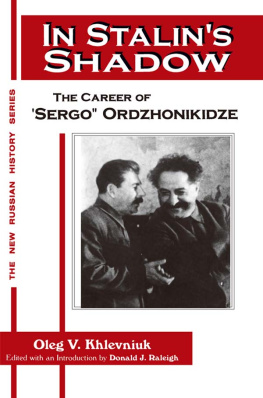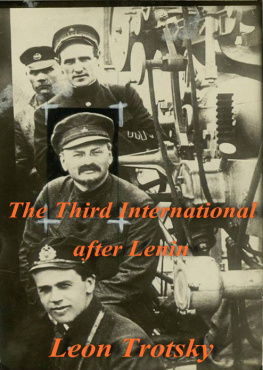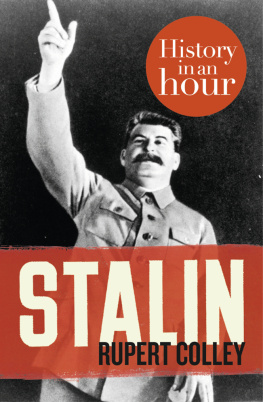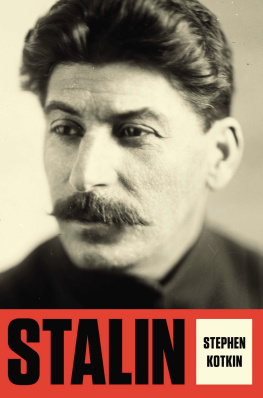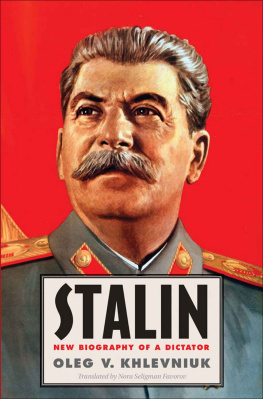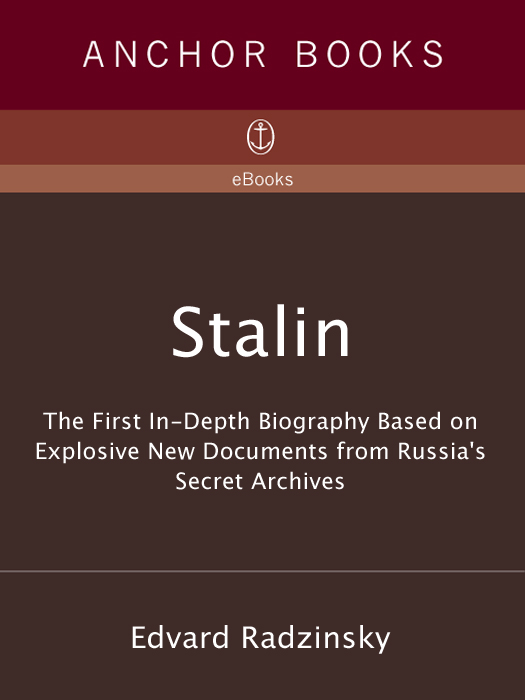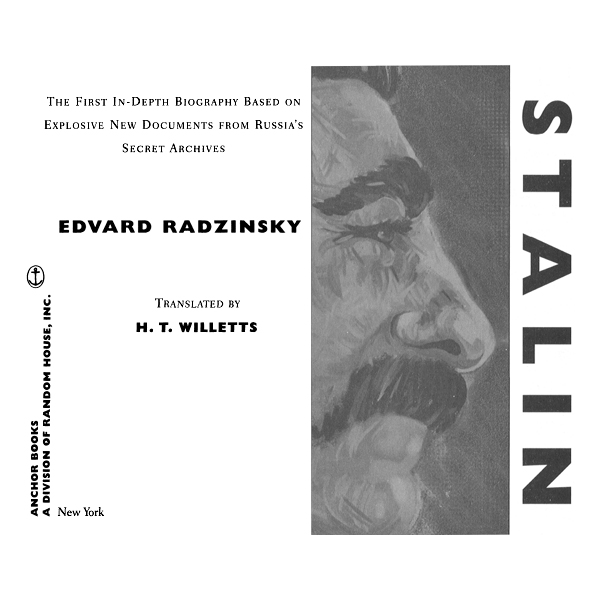A LSO BY E DVARD R ADZINSKY
T HE L AST T SAR:
T HE L IFE AND D EATH
OF N ICHOLAS II
FIRST ANCHOR BOOKS EDITION, SEPTEMBER 1997
Copyright 1996 by Edvard Radzinsky
English language translation copyright 1996 by Doubleday a division of Random House, Inc.
Translated from the Russian by H. T. Willetts
All rights reserved under International and Pan-American Copyright Conventions. Published in the United States by Anchor Books, a division of Random House, Inc., New York, and simultaneously in Canada by Random House of Canada Limited, Toronto. Originally published in hardcover in the United States by Doubleday in 1996. The Anchor Books edition is published by arrangement with Doubleday, a division of Random House, Inc.
Anchor Books and colophon are registered trademarks of Random House, Inc.
The Library of Congress has cataloged the Doubleday hardcover edition of this book
as follows:
Radzinski, dvard.
Stalin: the first in-depth biography based on explosive new
documents from Russias secret archives / Edvard Radzinsky;
translated by H. T. Willetts. 1st ed.
p. cm.
1. Stalin, Joseph, 18781953Sources. 2. Heads of stateSoviet
UnionBiographySources. 3. Soviet UnionHistory19251953
Sources. I. Title.
DK268.S8R29 1996
947.0842dc20 95-4495
eISBN: 978-0-307-75468-4
www.anchorbooks.com
v3.1
CONTENTS
ONE:
SOSO: HIS LIFE AND DEATH
TWO:
KOBA
THREE:
STALIN: HIS LIFE, HIS DEATH
NOTE
The dates used in this book up to February 1918 follow the old-style Julian calendar, which was in use in Russia until that month. In the nineteenth century the Julian calendar lagged twelve days behind the Gregorian calendar used in the West; in the twentieth century, the Julian calendar lagged thirteen days behind.
PREFACE
I have been thinking about this book all my life. My father dreamt of it till the day of his death. It is to him that I dedicate it.
I can still see that antediluvian day in March 1953 when the improbable happened: the event which it would have been a crime even to think of in our country.
I can see the unbearably bright March sunshine and the endless line of those eager to make their farewells to him. I see myself in the crowd of mourners. How lonely I felt among all those grief-crazed people. Because I myself hated him.
I had suffered a revulsion of feeling toward Stalin as an upper-classman at school: a transition from mindless adoration to a no-less ardent hatred, such as only the very young experience and only after mindless love.
This change of heart was brought about by my father and by his dangerous stories about Stalin. The real Stalin. Whenever my father spoke of him, he ended with the same words: Perhaps someday you will write about him.
My father was an intellectual with a passionate love of European democracy. He often repeated a saying which he attributed to President Masaryk of Czechoslovakia: What is happiness? It is having the right to go out onto the main square and to shout at the top of your voice, Lord, what a bad government we have! My father came from a well-to-do Jewish family. He was a rising young lawyer, twenty-eight years old, when the February Revolution brought down the monarchy. He enthusiastically welcomed the bourgeois Provisional Government. This was his revolution. This was his government.
But the few months of freedom were soon at an end, and the Bolsheviks came to power.
Why did hea highly educated man fluent in English, German, and Frenchnot go abroad? It is the old, old story: he was always devoted to that great and tragic country.
In the early twenties, while some vestige of freedom survived, my father edited an Odessan magazine called Shkvall (Squall) and wrote screenplays for early Soviet films. His close friends at the time were the writer Yuri Olesha, the theorist of the avant-garde Viktor Shklovsky, and also the film director Sergei Eisenstein. After my fathers death I discovered, miraculously preserved between the pages of one of his books, a letter from Eisenstein complete with a number of brilliant indent drawingsrelics of their youthful amusements.
But the epoch of thought control arrived, and the country became a great prison. My father did not grumble but went on living, or rather existing, quietly, inconspicuously.
He gave up journalism and began writing for the theater. He dramatized novels by one of the writers most esteemed by Stalin, Peter Andreevich Pavlenko, author of the scenarios for two famous films, The Oath and The Fall of Berlin, in which Stalin is among the dramatis personae. Pavlenkos ultrapatriotic screenplay Alexander Nevsky, about the thirteenth-century Russian warrior who defeated the Teutonic Knights, was filmed by the great director Eisenstein.
Pavlenko also wrote novels. Stalin conferred on him the highest of literary awards, the Stalin Prize, four times. Pavlenko had seen the Leader on a number of occasions. He had the entre to the magic circle surrounding the God-Man.
Pavlenkos name saved my father. Many of his friends vanished in the camps, but he himself was not touched. According to the logic of the time, my fathers arrest would have cast a shadow on the famous Pavlenko himself.
My father realized, however, that this protection might end at any moment. He expected, and was prepared for, something horrible. Yet in spite of living under the ax, in spite of his thwarted career, he never stopped smiling. His favorite hero was the skeptical philosopher in Anatole Frances novel Les Dieux ont soif, a man who observed the horrors of the French Revolution with mournful irony. My father observed the dreadful life of Stalins Russia with the same sort of smile. Irony and compassion were his watchwords.
In my memory he always wears that smile.
My father died in 1969. That is when I began writing this book. I have written it with no feeling of hatred for the Boss. I wanted only to understand the man himself and the horror through which we lived: I wrote surrounded by ghosts of those whom I saw in my childhood. I have included their stories about the Boss in this book, stories which my father loved to retell, always ending with the same refrain: Perhaps someday you will write about him.
PROLOGUE: THE NAME
And authority was given it over every tribe and people and tongue and nation and it was allowed to give breath to the image of the beast, so that the image of the beast should even speak, and to cause those who would not worship the image of the beast to be slain.
Revelation 13:7, 15
Then a mighty angel took up a stone and threw it into the sea, saying: So shall Babylon the great city be thrown down with violence, and shall be found no more for all nations were deceived by thy sorcery. And in her was found the blood of prophets and of saints and of all who have been slain on earth.
Revelation 18:2124
Every day the largest country in the world woke up with his name on its lips. All day long that name rang out in the voices of actors, resounded in song, stared out from the pages of every newspaper. That name was conferred, as the highest of honors, on factories, collective farms, streets, and towns. During the most terrible of all wars, soldiers went to their deaths intoning his name. During that war the city of Stalingrad bled almost to death; it lost all of its inhabitants, the ground became one great scab bristling with shells, but the city that bore his name was not surrendered to the enemy. During the political trials organized by him, his victims glorified his name as they died. Even in the camps, his portrait looked down on millions of people who, corralled behind barbed wire at his behest, turned rivers back in their course, raised cities beyond the Arctic Circle, and perished in their hundreds of thousands. Statues of this man in granite and bronze towered over the immense country.


